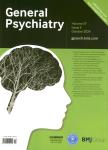Commentary on “Psychiatry and Cinema: What can We Learn from the Magical Screen?”
Commentary on “Psychiatry and Cinema: What can We Learn from the Magical Screen?”作者机构:Hesure International Inc Texas USA
出 版 物:《上海精神医学》 (Shanghai Archives of Psychiatry)
年 卷 期:2017年第29卷第5期
页 面:314-315页
核心收录:
学科分类:1303[艺术学-戏剧与影视学] 13[艺术学] 1002[医学-临床医学] 100205[医学-精神病与精神卫生学] 10[医学]
主 题:Filmmakers describe mental illnesses in different ways and show morbid mental phenomena using different film vocabularies
摘 要:Filmmakers describe mental illnesses in different ways and show morbid mental phenomena using different film vocabularies. This process is almost as long as the film s course. After all, film is about ideology. Metaphysically, there cannot be a lack of emotion and spirit, and the emotion towards morbidity and spiritual expression cannot be missing. It is the same as all the relationships between narrators and the ones being narrated, the one who was narrated in the narrator s mouth reflects the one being narrated himself and also brands the narrator s own shadow. This is like the relationship of a mirror and the person who looks into the mirror. The image in the mirror reflects the person who looks into the mirror and shows many characteristics of the mirror such as diopter and focalization. However, the mirror does not know about it; the narrator might not know about it as well. Since the objects described are themselves as well as their own way of thinking and the expression of their emotional state, seeing the psychotic patient described by a filmmaker one can catch a glimpse of the filmmaker himself and the cultural systems and ideologies that are embedded in them. This point will always be the source that is most interesting and most worthwhile to ruminate over when considering this topic.



